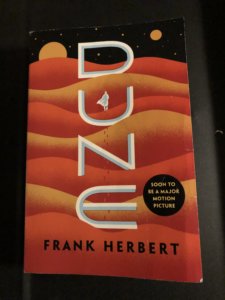DUNE, Chapter 1. A Study on Craft

For educators: This post is appropriate for teens who have read Dune and might want to to improve their storytelling/writing skills.
I happen to be in a writing critique group that started up this past week. A couple of the folks in this group are writing novels and sent in first chapters for a swipe at getting feedback. So, I read a few first chapters yesterday and in the course of my reading, I began to wonder…Do these seem like first chapters to me? How do I feel as a reader as I am taking in the narrative for the first time? Do I begin to have a strong sense about the story, the characters and about the writing style? Absolutely. I did and do have feelings and ideas. Some of those made me want to keep reading. Others did not.
That led me to the question: How does a novelist write a brilliant chapter one that makes you want to keep reading?
I wonder about my own first chapter, the beginning of my novel that is undergoing an extensive edit. What is it accomplishing and what is it not accomplishing? Have I done the necessary work to hook my reader, keep them interested and engaged, settle them into the world I am creating?
All writers of any genre ponder this question when they sit down before the blank page because the possibilities are endless, as endless as stories themselves. However, I do think there are ways to understand first chapters, to critique and edit them for the purpose of making them better.
Therefore, I begin a series of posts devoted to the question of beginnings. My focus will be on science fiction and fantasy novels and the hope is not to be prescriptive. Telling the writer what to do or not do detracts from originality and art. However, paying attention to how great authors craft a narrative is worthwhile. We learn from the greats. Study enough greats and we begin to see common threads.
So, my goal in this series of posts is to plunder first chapters and see what I can glean about my own writing and will record my findings for the sake of other writers.
 A Look at DUNE, Chapter 1
A Look at DUNE, Chapter 1
Frank Herbert is a great writer and though the novel DUNE isn’t perfect, it’s very close to perfect. How does that first chapter set us up for a marvelous journey?
I see it accomplishing four things.
Chapter 1…
-Gives us a sense of the setting in which the story will take place
-Introduces the primary characters, even putting the main character through a first test
-Hints at the coming conflict
-Tantalizes the reader with compelling mysteries that make you want to keep reading
Chapter 1 of DUNE give us a sense of the setting.
Here is the first sentence of the novel.
In the week before the departure to Arrakis, when all the final scurrying about had reached a nearly unbearable frenzy, an old crone came to visit the mother of the boy, Paul.
Most of us have experienced moving houses, cities, states. We know what it feels like to change locations. In this first sentence of DUNE, the reader is alerted immediately to the fact that a change in location is taking place for this particular family, for this particular person, Paul. Moving is disruption. Paul’s family is about to be disrupted. He will soon be leaving Caladan for a planet called Arrakis, sometimes called Dune.
Soon after, in the early paragraphs, Herbert repeats this series of words three times as paragraphs. They jump out on the page like a refrain. They are written in italics, which in Herbert’s style, represents thought. Paul, the main character continues to mull over this reality.
Arrakis—Dune—Desert Planet
So, not only will Paul be leaving his current location, but the new location is harsh. There is a sense of foreboding about this desert planet. Paul will move from Caladan, a land where water is plentiful to Arrakis, where water is scarce. Caladan is known, comfortable, secure, a virtual paradise. Arrakis is mysterious, uncomfortable in so many ways, in part because of its climate. Climate will be a large issue in the rest of the novel. Herbert wants the reader to begin thinking about ecology and its importance to a planet and a people.
Here is the second sentence of DUNE.
It was a warm night at Castle Caladan, and the ancient pile of stone that had served the Atreides family as home for twenty-six generations bore that cooled-sweat feeling it acquired before a change in the weather.
When Paul’s family leaves Caladan, they are not only leaving their current comfortable home/castle, but they are leaving their home of twenty-six generations. This move is an epic move. The reader is left asking…why? Why leave this lovely planet and this home of so many years? We get a few clues as to why this move it taking place. Power and political maneuvering are introduced, a profound subject of the story.
Thufir Hawat, his father’s Master of Assassins, had explained it: their mortal enemies, the Harkonnens, had been on Arrakis eighty years, holding the planet in quasi-fief under a CHOAM Company contract to mine the geriatric spice, mélange. Now the Harkonnens were leaving to be replaced by the House of Atreides in fief-complete—an apparent victory for the Duke Leto. Yet, Hawat had said, their appearance contained the deadliest peril, for the Duke Leto was popular among the Great Houses of the Landsraad.
Arrakis is the place where the empire derives its most important resource: Melange, or spice, as it is sometimes called. Melange is the secret to space travel in this particular universe.
We can already see now how the chess pieces are stacking up, a sense of the conflict.
This brings us to the second accomplishment of Herbert’s chapter one, the introduction of most of the main characters.
Paul is mentioned in the first sentence. So is his mother. Paul’s mother and Paul are on the stage for the very final scene of the novel as well. In fact, his mother gives voice to the final paragraph/speech.
Not only that, but the crone mentioned in that first sentence, the one who will test Paul later in the chapter, will also be on that stage at the finale. This is great writing.
Add to the list the Bene Gesserit, the Fremen, House Harkonnen…all are mentioned, Thufir Hawat, (who will be present in the final scene) and Dr. Yueh, important as the one who betrays House Atreides…all are introduced in chapter 1.
Note this paragraph early in the chapter.
Paul awoke to feel himself in the warmth of his bed—thinking…thinking. This world of Castle Caladan, without play or companions his own age, perhaps did not deserve sadness in farewell. Dr. Yueh, his teacher, had hinted that the faufreluches class system was not rigidly guarded on Arrakis. The planet sheltered people who lived at the desert edge without caid or bashar to command them: will-o’-the-sand people called Fremen, marked down on no census of the Imperial Regate.
The Fremen will become important to the story, of primary importance, but the reader is simply introduced here. There is mystery surrounding these people. I am curious. I want to learn more and Herbert will plunge me into Fremen culture before too long.
It’s interesting to note who is left out of chapter 1.

Chapter 1 hints also at future conflict.
As Paul is undergoing the test, the gom jabbar, here is what the Reverend Mother, the crone says to him.
The old woman said: “You’ve heard of animals chewing off a leg to escape a trap? There’s an animal kind of trick. A human would remain in the trap, endure the pain, feigning death that he might kill the trapper and remove a threat to his kind.”
As I was re-reading the chapter last night, this nugget stopped me in my tracks. I had not realized, not seen how this Reverend mother quote foretells the remainder of the story.
Paul does feign death on Arrakis, so that he might kill the trapper and remove the threat to his family. That is, in essence, a summary of the novel. These two sentences are so brilliantly placed, subtle in all the best ways. We don’t understand consciously upon first reading, but Herbert has just told us what we can expect.
Lastly, chapter 1 teases the reader with mysteries.
This is an odd world, a mysterious one in which a mother of an only son, will give him up to a religious figure, knowing he might die.
Jessica stepped into the room, closed the door and stood with her back to it. My son lives, she thought. My son lives and is…human. I knew he was…but…he lives. Now, I can go on living.
This we absorb and I, at least, want to read to find out more about this bizarre world where such a thing would happen. In order to know more, I must keep reading.
Then, there is the planet Arrakis and the Fremen. In chapter one, we learn very little about them, but we wonder about them as Paul does. The planet is a desert and the Fremen seem to live off the grid. They are wild and uncounted by the empire. Who are they? We are meant to wonder, and to find out, I have to keep reading.
And lastly, in Chapter 1, Herbert introduces the reader to the idea of the Kwisatz Haderach, a messianic figure. Is Paul the Messiah? The reader suspects he is, though Paul himself struggles with this identity throughout the novel, mysterious even to him. We will have to keep reading if we want to figure out the true identity of the Kwisatz Haderach.
So…all of this in Chapter 1. I am wowed and I am hooked. I am also set up well in the world to take in more of the details as they unfold. Moreover, I have enough sense of the main characters to be able to navigate this complex world where many more characters will soon be introduced. It makes me wonder how many times Herbert went back to edit and perfect his beginning…because I don’t think he could have written a better version than the one we read today.


